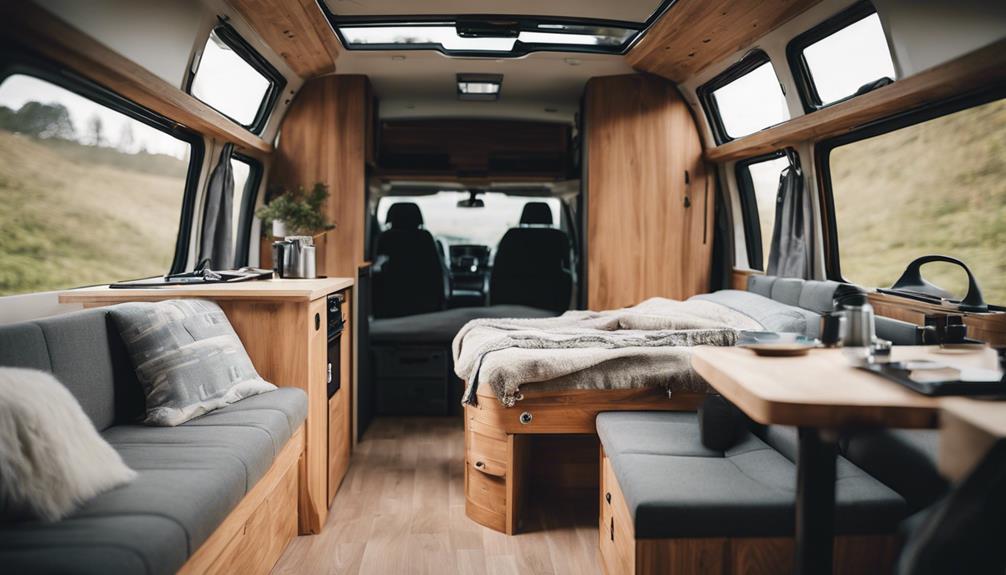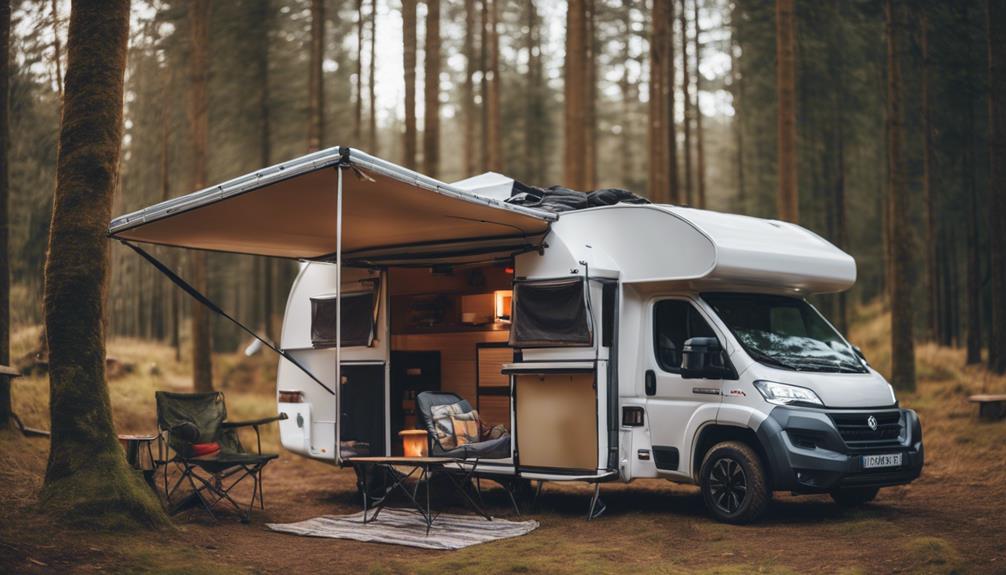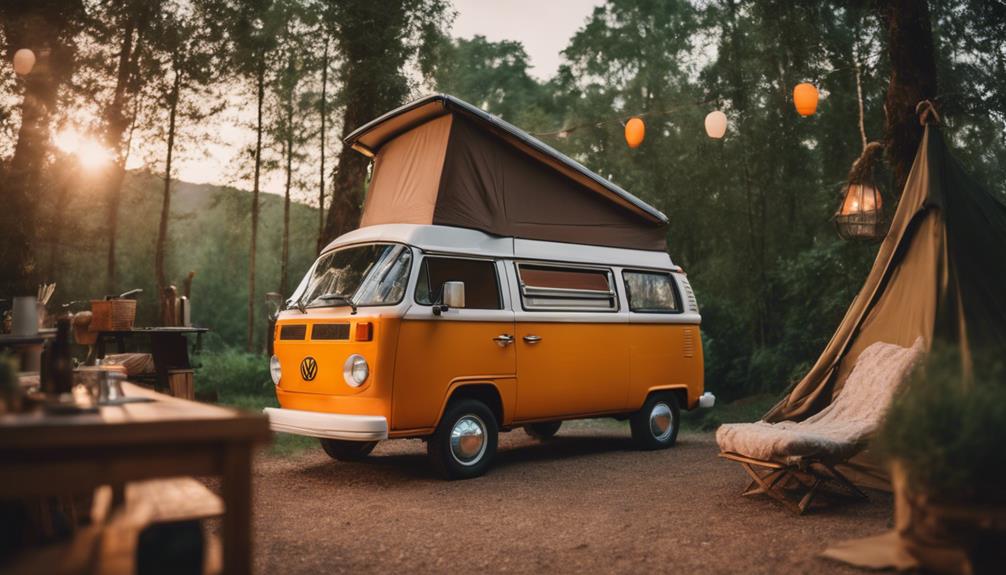When choosing the best van for camper conversion, consider popular models like the Ford Transit, Mercedes Sprinter, and Ram ProMaster. These options offer the versatility and reliability you need for a successful transformation. Each van provides ample space, allowing you to customize your setup to fit your lifestyle. Electric vans are also gaining traction, delivering eco-friendly benefits and lower operating costs. As you plan your conversion, think about essential tools and materials that will optimize your project. If you want to uncover more tips and insights on the conversion process, stick around for a deeper exploration.
Introduction
When you're choosing the best van for camper conversion, it's essential to weigh factors like space, comfort, and functionality to guarantee an enjoyable travel experience.
Popular van models like the Ford Transit, Mercedes Sprinter, and Ram Promaster each present unique advantages that cater to different needs. For instance, the Ford Transit is known for its versatile interior space, while the Mercedes Sprinter offers excellent fuel efficiency and a robust build. On the other hand, the Ram Promaster is favored for its easy accessibility due to its wide sliding doors.
Budget considerations are also important; you might find older models under $20,000 or newer, well-equipped vans exceeding $50,000. Beyond the initial purchase, remember that camper van conversions can range from $5,000 to over $100,000 based on your customization desires.
Key elements like insulation, electrical systems, and plumbing setups play a significant role in enhancing comfort and livability on the road.
Background Information
In recent years, you've likely noticed a surge in the popularity of van conversions, with more people embracing the van life lifestyle.
Electric camper vans are also emerging, offering eco-friendly options for your adventures.
Understanding these trends can help you make an informed choice when selecting the best van for your conversion.
Van Conversion Popularity Surge
The growing trend of remote work and travel flexibility has sparked a significant surge in camper van conversions, attracting a diverse array of adventurers enthusiastic for mobility and exploration. Many people are embracing the 'van life' culture, opting for camper vans as a way to adopt a minimalist lifestyle while enjoying the freedom to travel.
With models like the Ford Transit and Mercedes Sprinter leading the market, these vehicles offer both reliability and durability, making them ideal for conversion. The availability of DIY conversion kits has made the process more accessible, allowing you to create a personalized space that reflects your unique style and needs.
Plus, the strong resale value of converted vans is appealing, as it guarantees your investment retains worth over time. As technological advancements enhance safety and integrate smart features, modern camper van conversions are becoming even more attractive to those pursuing adventure.
With the combination of remote work opportunities and the allure of life on the road, it's no wonder that camper van conversions are surging in popularity, providing you with the chance to explore while enjoying the comforts of home.
Emergence of Electric Camper Vans
Emerging as a sustainable choice for adventurous travelers, electric camper vans are gaining traction among eco-conscious consumers who seek both mobility and reduced environmental impact. Companies like Winnebago and Volkswagen are leading the charge, introducing electric models that cater to this growing market. With a range on a single charge typically between 100-300 miles, these vehicles offer ample travel distance for most road trips.
The expanding charging infrastructure makes it increasingly feasible to find charging stations during long journeys, particularly in urban areas and along popular travel routes. Many electric camper vans come equipped with solar panels, which not only promote off-grid living but also lessen dependence on traditional charging sources.
Another appealing factor is the total cost of ownership. Over time, you might find that reduced fuel costs, combined with potential tax incentives for electric vehicle purchases, make these vans a financially savvy choice.
As you weigh your options for camper conversion, consider how an electric camper van could align with your eco-conscious lifestyle while providing the freedom to explore the great outdoors.
Electric Van Conversion Options
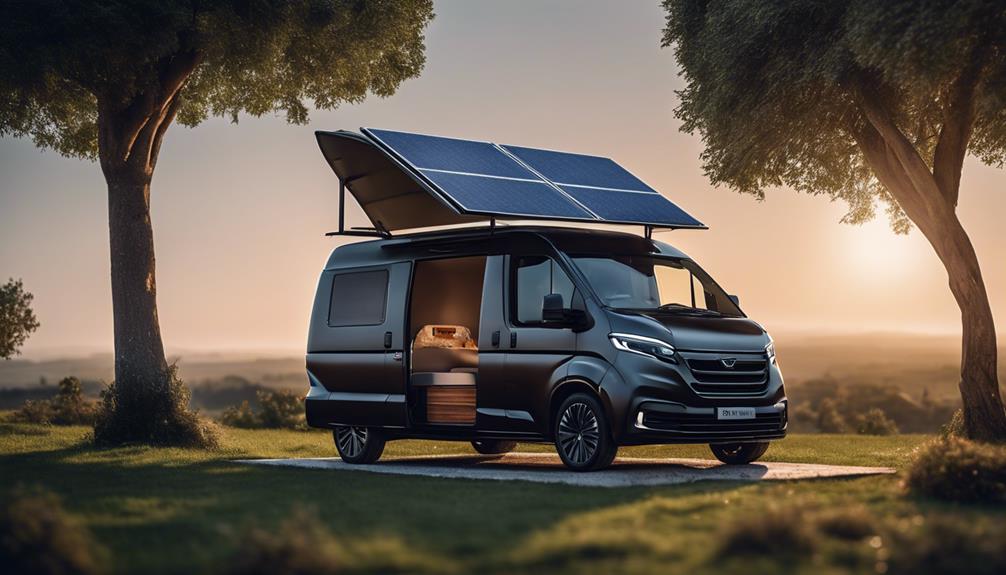
If you're considering an electric van for your camper conversion, you'll find models like the Mercedes eSprinter and Ford E-Transit leading the charge.
With impressive battery ranges and convenient charging options, these vans are perfect for eco-friendly adventures.
You'll also need to think about how to optimize your setup for off-grid living while managing weight and functionality.
Electric Van Models Emerging
Exploring electric van models like the Mercedes eSprinter and Ford E-Transit opens up exciting possibilities for eco-friendly camper conversions. These electric vans are becoming increasingly popular among van life enthusiasts due to their zero-emission capabilities and advanced technology.
The Ford E-Transit, for instance, boasts a driving range of up to 126 miles on a full charge, making it an excellent choice for short to medium trips while minimizing your environmental impact.
When considering camper conversions, you'll find that electric vans often require specialized components, such as high-capacity battery systems and electric appliances, to guarantee peak functionality.
The integration of regenerative braking systems enhances energy efficiency, allowing you to make the most of every journey. Plus, the growing availability of charging infrastructure, including fast chargers, makes these electric vans a more viable option for longer adventures.
Battery Range and Charging Options
When choosing an electric van for conversion, understanding battery range and charging options is essential for planning your adventures effectively. Electric vans like the Ford E-Transit and Mercedes eSprinter typically offer a battery range of 70 to 150 miles on a single charge, which is ideal for urban commuting and short trips.
When it comes to charging options, you have several choices. Level 1 (120V) home charging can take up to 24 hours for a full charge, while Level 2 (240V) charging reduces this time to about 8-12 hours. For quicker refueling, fast charging stations can charge your van to roughly 80% in just 30 minutes, making long journeys much easier.
Moreover, many electric vans feature regenerative braking systems that enhance battery range by converting kinetic energy back into stored energy during braking.
If you're looking for off-grid capabilities, integrating solar panels on the roof of your electric van can provide supplementary charging, reducing your reliance on traditional charging stations and allowing for more freedom on your adventures.
Expert Insights on Electric Vans
When considering electric vans for your camper conversion, it's crucial to weigh their advantages and disadvantages.
You'll want to hear expert insights on performance and efficiency, especially since these vehicles are designed for eco-friendly adventures.
Let's explore how they stack up against traditional models and what features can enhance your travel experience.
Advantages and Disadvantages
What makes electric vans an appealing choice for camper conversions is their combination of environmental benefits and cost savings, despite some challenges related to charging infrastructure and initial investment.
One of the major advantages of electric vans is their zero tailpipe emissions, making them an eco-friendly choice for those who prioritize sustainability. You'll also enjoy considerable fuel savings, as electricity is generally cheaper than gasoline, and maintenance costs tend to be lower due to fewer moving parts.
In terms of torque and performance, electric vans offer instant torque, resulting in smooth acceleration and better handling, which is especially beneficial in urban environments or during climbs. However, one of the disadvantages lies in the charging infrastructure; while it's improving, availability can be limited in remote areas. This requires careful planning for long trips, as charging times can vary greatly.
Additionally, the initial cost of electric vans is typically higher than traditional models. However, don't forget that government incentives and rebates can help offset these expenses, making electric vans more financially viable over time for your camper conversions.
Balancing these advantages and disadvantages will help you make an informed decision.
Electric Van Expert Insights
With the advantages and disadvantages of electric vans in mind, let's explore expert insights on why these vehicles are becoming a top choice for camper conversions.
Electric vans like the Ford E-Transit and Mercedes eSprinter provide significant environmental benefits, boasting zero emissions that appeal to eco-conscious travelers. Their reduced operating costs further enhance their attractiveness, making them budget-friendly options in the long run.
One notable feature of these vans is their lower maintenance costs. With fewer moving parts than traditional combustion engines, you can expect less frequent servicing, saving you time and money.
Fast charging capabilities are another advantage, with some models reaching 80% charge in about 30 minutes, ensuring you can get back on the road quickly during your trips.
Additionally, the compatibility of solar panel systems with electric vans boosts their off-grid capabilities. This means you can enjoy extended camping excursions without worrying about battery depletion.
As electric vans continue to gain popularity for camper conversions, their combination of advanced technology and sustainability makes them a smart choice for outdoor enthusiasts seeking a modern, efficient travel experience.
Electric Van Performance Review
Electric vans like the Ford E-Transit and Mercedes eSprinter deliver impressive torque and instant acceleration, making them ideal for both urban driving and camper conversions.
The Ford E-Transit offers an estimated range of up to 126 miles, which is perfect for weekend getaways or daily commutes. With a rapidly expanding charging infrastructure, including over 100,000 public charging stations in the U.S., recharging during travel is becoming increasingly convenient.
When you consider maintenance, electric vans generally come with lower maintenance costs compared to traditional combustion engine vans. They require less frequent servicing and have fewer moving parts, which can save you money in the long run.
Plus, using electric vans for camper conversions contributes to lower overall emissions, effectively reducing your carbon footprint. This aligns perfectly with sustainability goals that many van lifers embrace.
Essential Tools for Conversion
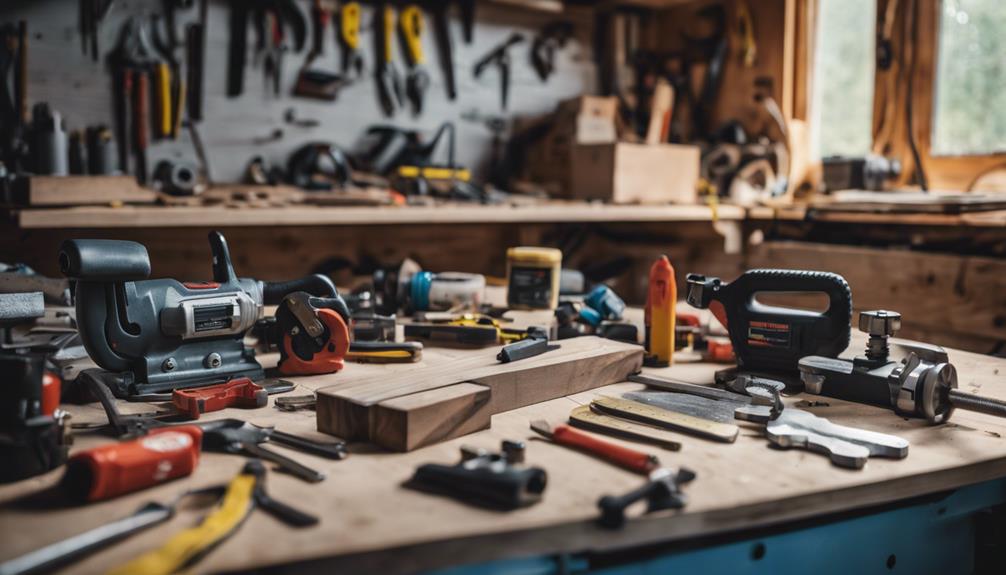
When you're gearing up for a van conversion, having the right tools is key to a successful project.
You'll want to focus on essential conversion process steps and gather recommended tools that make your work easier and more efficient.
Let's explore what you'll need to get started and guarantee everything fits perfectly.
Essential Conversion Process Steps
Planning your camper van conversion involves several vital steps, each requiring specific tools to secure a successful and efficient process.
Start with a detailed layout plan that optimizes space for essential features like sleeping areas, kitchenettes, and storage solutions. Once you've mapped out your design, strip the van of existing fittings and flooring to create a clean slate for the insulation phase.
Using high-quality insulation materials is essential for regulating temperature and enhancing comfort, so make sure you cover walls, floors, and ceilings thoroughly.
Next, you'll tackle electrical installation. Set up a robust electrical system, incorporating solar panels, batteries, and wiring for lights and appliances. It's wise to budget around 30% of your total conversion costs for these systems.
Conversion Tool Recommendations
A well-equipped toolkit is fundamental for a successful camper van conversion, ensuring you have the right tools to tackle each phase of the project efficiently.
Start with a circular saw for cutting wood and materials, which is critical for framing and building structures. You'll also need a power drill to assemble and secure components, making your tasks much easier. For detailed cuts around windows and fixtures, a jigsaw is indispensable.
Don't forget a level; it's essential for ensuring surfaces are even during installation, especially for cabinets and appliances. A tape measure is a must-have for precise measurements of your van's interior, helping you fit furniture and storage solutions correctly.
Safety equipment, like goggles and gloves, should always be worn when working with power tools to prevent injuries. Finally, a multi-tool is incredibly useful for various tasks, such as tightening screws, cutting, and making adjustments.
With these fundamental tools in hand, you'll be well-prepared to engage in your camper van conversion and achieve the interior design you envision.
What are the Benefits of Using a MWB Van for Camper Conversion?
The best medium wheelbase van is an ideal choice for camper conversion due to its size and flexibility. It offers plenty of space for customizing the interior layout, while still being easy to drive and maneuver. With a MWB van, you can enjoy the benefits of a comfortable and functional camper without the hassle of a larger vehicle.
What Makes the Ideal Van for Camper Conversion in Canada?
When looking for the best camper conversion van Canada, it’s essential to consider factors such as the van’s size, fuel efficiency, and off-road capabilities. A van with ample space for sleeping and storage, good gas mileage, and the ability to navigate rugged terrain will make for an ideal camper conversion in Canada.
Conclusion
Finding the right van for your camper conversion is essential to ensuring a fulfilling and enjoyable adventure on the road. You'll want to evaluate popular models like the Mercedes Sprinter, Ford Transit, and Ram ProMaster, as these are among the best vans for camper conversions.
Start by setting a realistic budget—conversion costs can range widely, so knowing what you can spend upfront helps guide your choices. Don't overlook resale value, as investing in models known for retaining their worth, such as the Sprinter and Transit, can pay off in the long run.
Additionally, be mindful of legal requirements; converted vans may need re-registration and specific insurance coverage tailored to camper specifications.
Utilizing community resources, forums, and guides will provide you with invaluable insights throughout your van conversion journey. Engaging with fellow enthusiasts can help you navigate challenges and discover tips to customize your space to fit your needs.
Ultimately, the right van can transform your travel experiences, offering the freedom to explore while enjoying the comforts of home. So, roll up your sleeves, and let the adventure begin!
Frequently Asked Questions
What Type of Van Is Best for Camper Conversion?
When considering the best type of van for camper conversion, think about your needs. Cargo vans offer space and flexibility, while passenger vans provide comfort. Ultimately, choose based on your travel style and requirements.
What Is the Most Reliable Used Conversion Van?
When you're looking for the most reliable used conversion van, the Mercedes Sprinter stands out due to its solid build quality and strong resale value. Ford Transit and Ram Promaster are great alternatives, too.
What Is the Best Vehicle to Convert to a Campervan?
When considering the best vehicle to convert into a campervan, you should explore options like the Mercedes Sprinter, Ford Transit, and Ram Promaster. Each offers unique benefits, catering to different needs and budgets.
What Is the Best Budget Van to Convert to Camper?
If you're looking for a budget-friendly van to convert, consider the Ram Promaster City or Nissan NV200. Both offer great fuel efficiency and affordability, making them perfect for your camper conversion project without breaking the bank.
Conclusion
To summarize, choosing the best van for your camper conversion can transform your travel experience.
With electric van options on the rise, you'll find eco-friendly choices that suit your needs.
Don't forget to gather the essential tools to make your conversion process smooth and enjoyable.
Whether you're a DIY enthusiast or seeking expert advice, you're well on your way to creating the perfect mobile home.
Get started on your adventure and enjoy the freedom of the open road!

